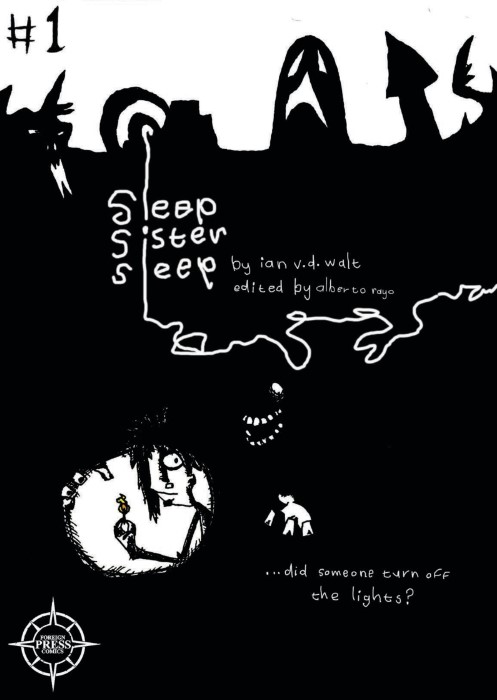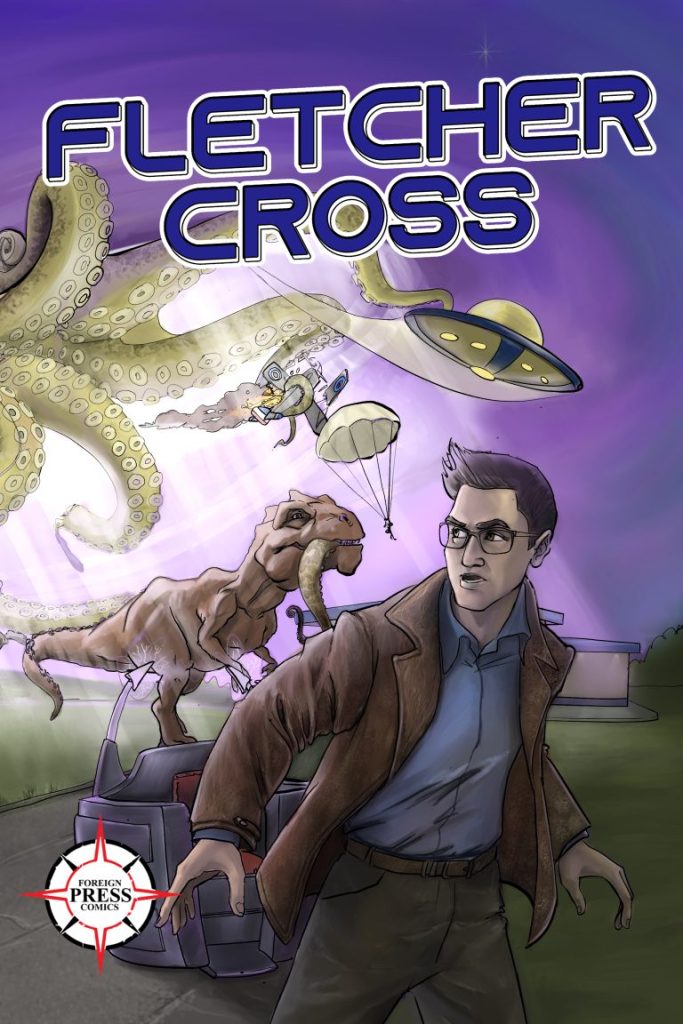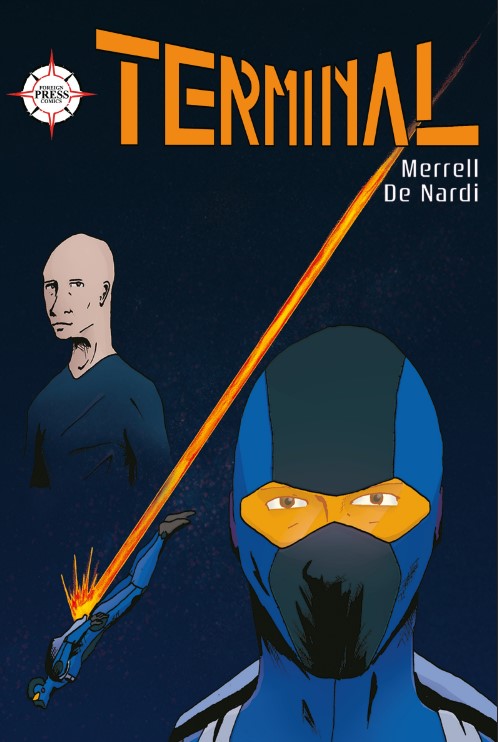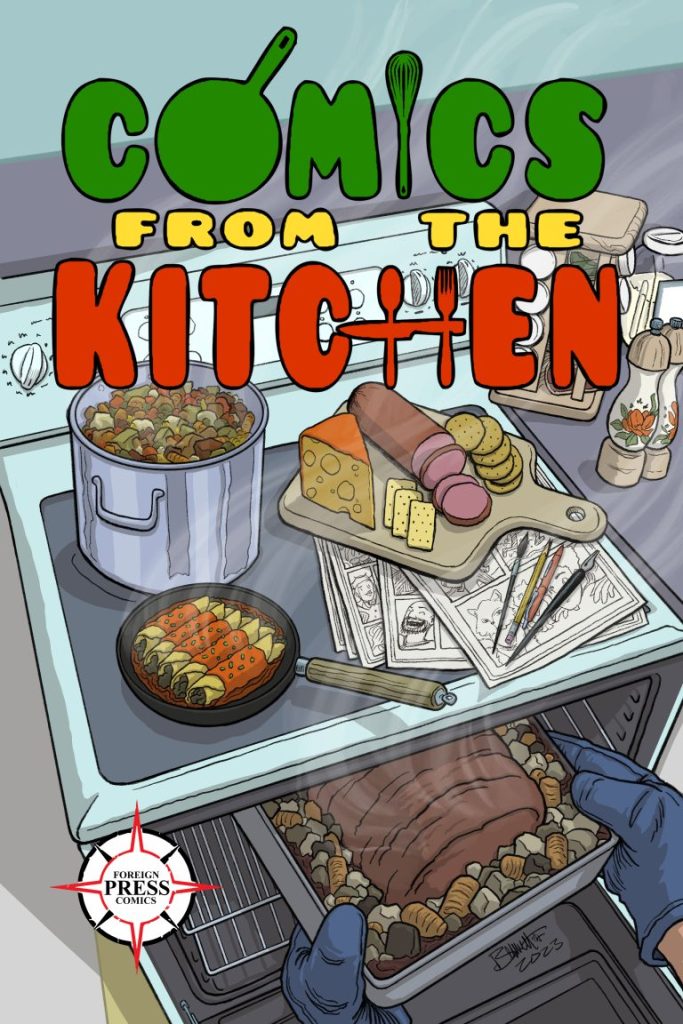Hey there, everyone! Welcome to another exciting episode where we delve into the world of indie comics and the talented individuals behind them. Today, we have the pleasure of introducing Kylar Merrell, an elementary teacher from Oklahoma who leads a double life as the head of Foreign Press Comics. With a passion for creativity, collaboration, and the indie comics community, Kylar is a shining example of the power of imagination. So, buckle up and get ready to explore the wonderful world of Foreign Press Comics and the mind of Kylar Merrell!
My name is Kylar Merrell, and by day, I’m an elementary teacher in Oklahoma, but by night, I am the head of Foreign Press Comics, an independent comic publisher dedicated to creativity, collaboration, and the indie comics community. If I’m not doing one of those things, I’m probably on the couch trying not be attacked by one of my two cats, Harley and Magik.
I’ve wanted to be a writer or some sort of creator from a very young age, with a real love of writing developing in third grade (shoutout to Ms. Gray). But in high school, I got into comics, and Francis Manapul’s Flash run showed me that comics can be more artistic and more meaningful that the “extreme,” 90’s, BAM POW that I thought comics was. Over time I continued to write and draw, and eventually in college I came to the conclusion that if not now, then when? And I started making my own comics.
Like I said before, my love of comics came from the Flash in the New 52, by Brian Buccellato and Francis Manapul, and that made me want to explore comics as a medium. I had always wanted to be a creative of some sort, but had a fear that people wouldn’t like my work. Eventually, I realized that no one’s work is perfect, and even for the creators that I hate, there are people out there who love them dearly, so there’s always going to be SOMEONE who likes what you do, so why not just start?
I always make sure to tell stories that are driven by a character, and by that character’s desire to change, even if they themselves don’t realize it. The most common theme among my stories is discovering who you are, and being tested to see what kind of person you will become. Any story that is driven by character will hopefully give your audience a reaction, and personally I don’t care whether they agree or disagree with the outcome; if they have some kind of emotion about the character, however small, it means it impacted them in some way.
I’ll always love the medium of print comics, but I understand the difficulties that come with printing and managing a printed project, so for digital comics, I have both my own website and I use GlobalComix. I don’t really care about the platform, as long as it is doing a good job of getting my work out to new readers.

I’m not in a place to judge a platform and critique other people. I’m using their platform, whether that’s Squarespace (where I host my website) or GlobalComix, and it’s working, so I don’t think that my input matters. I just want a place to share my stories with people.



The indie scene is important for a few reasons. For one, it offers a place for new creators to cut their teeth and practice their skill. For another, and perhaps a more important reason, independent comics is where creators get to tell their own stories, uninterrupted by larger publishers and parent companies. For instance, if someone works at Marvel, Marvel (and by association, Disney) is going to offer some sort of control over what kinds of stories that creator tells and how they tell them. There is a house style for art, writing, and lettering, and while a few things stand out, most of them are controlled. In the independent scene, creators can tell their own stories, the way they want to, especially creators who would normally be marginalized by big business, in the style that they think that story fits best in. That just can’t happen for larger businesses who are so dedicated to their bottom line.
The most unique storytelling technique that I’ve used is on a particular project called Outlaw Country. Outlaw Country is my ode to country music, of which I’m a big fan, specifically the outlaw country subgenre, and I figured that the best thing to do, to show that love, is to include a curated playlist for the book. So wherever people can read the book, they also can listen to the accompanying playlist and hear the sounds that inspired the story.
The biggest avenues I use to engage my audience are social media, my podcast, and in-person conventions. My podcast Comics Unscripted is an interview podcast published bi-weekly, that features comic creators talking about their projects, their creative processes, and it provides listeners with a chance to get to know the creators themselves. This allows me to meet other professionals in my field and to learn from them, while also being a safe space in the community. As far as conventions go, we are new to conventions, with last year being our first year, but I loved them and can’t wait to go back. They are a great way to meet new fans and communicate with people you haven’t met before who may not have heard about you.
There are two main struggles that I face, the first of which being bringing in new readers, and not just new readers of my work, but new readers of independent comics in general. The second struggle is social media. Social media marketing is almost a full-time job unto itself, apart from the actual creation of the comics, and when you add on social media algorithms and the current issues facing Twitter (our main platform of choice), and it can be nearly impossible.
I’m just consistently amazed by the community of independent comic creators that surrounds me. There are hundreds, if not thousands of people that I see online every day who are trucking along, making their comics, and that alone is enough to be inspiring to me.
For writers and artists alike, just tell the stories that you want to tell. There is something out there that you can speak to, better than anyone else, so just find that theme, or that topic, and tell it. And to add to that, tell it the way that you want to. Don’t worry about how it will sell, or who will read it. It’s like the Field of Dreams quote, “build it and they will come,” or however that goes.
I don’t think that my creative process is anything to write home about. It’s mostly coming up with ideas, and then figuring out the best way to carry those ideas out. Then I write a script, find an artist, and make the dang thing! But the best thing that I can say on the topic of being motivated and consistent may seem to be antithetical, but it’s to learn to stop. Sometimes, when the ideas just aren’t flowing, or the motivation just isn’t there, you’re burnt out on that project. Now sometimes that means to completely stop and take a break from any creative thing, but sometimes it’s just moving on to another project for a few days, try to write something else, and come back to the main project later.
To be honest, I don’t really differentiate the creative and business sides. I have a big list, with everything I need to do on it, and I just prioritize the top five to ten things that need to be done. To go along with my above point, I can bounce around on that list if one of those items just isn’t motivating me, and I come back to it later on.
The biggest helper for funding creative projects, especially in comics are crowdfunding platforms like Kickstarter and Zoop. These allow you to mobilize your audience and have your fans help you on your way to funding your projects, and the best tip I have along those lines is to do your best to not let the hype die. After one campaign, start funneling your energy and your audience toward your next project, even if it’s not ready yet. Keep people engaged.
Twitter is the best way to stay up to date on what is happening, and then independent comics news sites like Comic Book Yeti. I also stay abreast of what’s going on on Kickstarter and other platforms, to see what is selling and what isn’t.
I think that the comics industry is evolving, based on the moves to social media, the rise of manga, and the overwhelming rise in major publishers turning to the crowdfunding platforms that were formerly reserved for independent creators. I think that the more we move in these directions, the more that people will see that it is possible to do it for themselves and that the best time to start is right now.
Comics is an industry fueled by collaboration. There is usually a writer and at least one artist on each book, so I have several frequent collaborators, like my colorist Eros de Nardi and writer/editor Derrick Crow. But as someone building a publishing company, my collaborations with other creators and their projects have been very eye opening to me, in terms of knowing what to offer other people and what I can bring to the table as a creator myself.
My crazy long term goal is to have Foreign Press Comics on shelves across the world, and I think that while difficult, that is plausible. I just plan to continue doing what I’m doing and collaborating with people, and building relationships so that I can continue to sell my book to more and more people.
My three biggest accomplishments in comics are my first self-published book Terminal, which was a labor of love, my successful crowdfunding campaign for my narrative anthology Fletcher Cross, and my podcast having close to 50 episodes (two years). Success is different to everyone, and to me, it’s just doing things that I never thought possible and proving to myself that I really can do these things.
I launched Fletcher Cross on Kickstarter in August of 2021. I had previously attempted a Kickstarter campaign for another project called Stonewood Mountains, that did not go over well. I thought that I had learned a lot, so I launched my new project Fletcher Cross, having prepared more and done a lot of work to build up the project so that we could fly past our goal. But we didn’t. We were woefully short again, and the experience taught me to persevere, because we relaunched Fletcher Cross in May of 2022 and succeeded. It taught me more about how to communicate and collaborate with others, and it also taught me how to better prepare for a successful crowdfunding campaign, which is a tool that I am still using today.
And that brings us to the end of our journey into the creative world of Kylar Merrell and Foreign Press Comics. We hope you’ve enjoyed discovering the passion and dedication that goes into indie comic publishing, and that you’ll be inspired to support the indie comics community. Remember to keep an eye out for more fantastic content from Foreign Press Comics, and as always, thanks for joining us. Until next time, stay creative and keep supporting independent artists!
Stec Studio is a New Jersey-based company founded and run by by the Stec Sisters. We specialize in producing interactive comics and novels based on All Ages of Geek media, as well as creating a fully open world Boys Love Universe called BLU Media. This universe is being built from various media forms, including readable media, games, and animations.
Our main series, I Married a Monster on a Hill, is a popular WEBTOON that tells the story of a retired knight who falls in love with a half-monster. We are also developing an in-production visual novel called I Married a Monster on a Hill: Dates, along with an upcoming Wattpad Exclusive set in the same Universe. At Stec Studio, our goal is to create content that gives people hope and light, and we hope our stories can provide joy and entertainment to all who experience them.